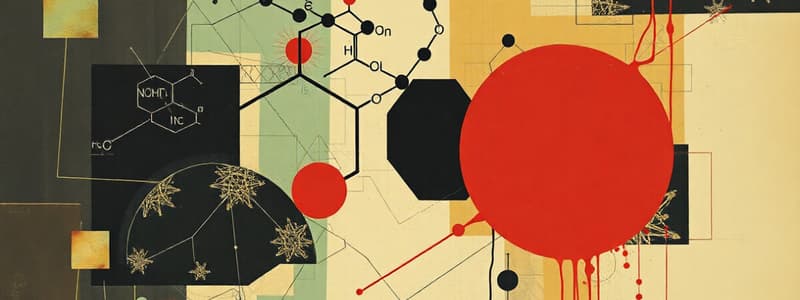Podcast
Questions and Answers
What are the three main areas of study for each functional group?
What are the three main areas of study for each functional group?
Properties, Nomenclature, and Reactions
What is the ending used for alkanes?
What is the ending used for alkanes?
ane
Alkanes are polar molecules.
Alkanes are polar molecules.
False (B)
The prefix ______ is used for 4 carbon atoms.
The prefix ______ is used for 4 carbon atoms.
Which of the following elements are TYPICALLY found in organic compounds?
Which of the following elements are TYPICALLY found in organic compounds?
Inorganic compounds are usually flammable.
Inorganic compounds are usually flammable.
The longest continuous carbon chain in a branched alkane must be written horizontally.
The longest continuous carbon chain in a branched alkane must be written horizontally.
What is the name of the compound with the following structure: CH3-CH2-CH-CH2-CH3
What is the name of the compound with the following structure: CH3-CH2-CH-CH2-CH3
What is the name of a 6-carbon cyclic alkane?
What is the name of a 6-carbon cyclic alkane?
Isomers have the same molecular formula but different structures.
Isomers have the same molecular formula but different structures.
What are the three structural isomers of C5H12?
What are the three structural isomers of C5H12?
Flashcards
Organic Compound
Organic Compound
A compound containing carbon and hydrogen, and sometimes other elements like oxygen, sulfur, nitrogen, phosphorus, or halogens.
Alkane
Alkane
An organic compound with only carbon-carbon single bonds and carbon-hydrogen bonds.
Branched Alkanes
Branched Alkanes
Alkanes with carbon chains that have branches.
Cycloalkane
Cycloalkane
Signup and view all the flashcards
Isomers
Isomers
Signup and view all the flashcards
Functional Group
Functional Group
Signup and view all the flashcards
Carbon-Carbon Single Bond
Carbon-Carbon Single Bond
Signup and view all the flashcards
Organic vs. Inorganic Compounds
Organic vs. Inorganic Compounds
Signup and view all the flashcards
Prefixes (Nomenclature)
Prefixes (Nomenclature)
Signup and view all the flashcards
Alkyl group
Alkyl group
Signup and view all the flashcards
Alkane Naming
Alkane Naming
Signup and view all the flashcards
Melting Point(mp)
Melting Point(mp)
Signup and view all the flashcards
Boiling Point(bp)
Boiling Point(bp)
Signup and view all the flashcards
Water Solubility
Water Solubility
Signup and view all the flashcards
Flammability
Flammability
Signup and view all the flashcards
Covalent Bonds
Covalent Bonds
Signup and view all the flashcards
Ionic Bonds
Ionic Bonds
Signup and view all the flashcards
Nonpolar
Nonpolar
Signup and view all the flashcards
Polar
Polar
Signup and view all the flashcards
Organic Nomenclature
Organic Nomenclature
Signup and view all the flashcards
Alkane Ending
Alkane Ending
Signup and view all the flashcards
Molecular Formula
Molecular Formula
Signup and view all the flashcards
-yl ending
-yl ending
Signup and view all the flashcards
Multiple branches (di-, tri-, etc.)
Multiple branches (di-, tri-, etc.)
Signup and view all the flashcards
Study Notes
Organic Compounds and Alkanes
- Organic compounds contain carbon and hydrogen, sometimes also oxygen, sulfur, nitrogen, phosphorus, or a halogen.
- Carbon typically forms four bonds.
- Nitrogen typically forms three bonds.
- Oxygen typically forms two bonds.
- Sulfur typically forms two bonds.
- Hydrogen typically forms one bond.
- Halogens typically form one bond.
How to Approach Unit 4
- Functional groups are different types/categories of organic molecules.
- For each functional group, properties, nomenclature, and reactions are important.
- Unit 4 focuses on alkanes, alkenes, alkynes (Chapter 11); alcohols, thiols, ethers, aldehydes, ketones (Chapter 12); and carboxylic acids, esters, amines, amides (Chapter 14).
- First, focus on alkanes' properties and nomenclature.
- Second, cover the rest of the functional groups' properties and nomenclature.
- Third, learn all the reactions related to the functional groups.
Organic vs. Inorganic Compounds
| Feature | Organic | Inorganic |
|---|---|---|
| Elements | C, H, sometimes N, O, S, halogens | Entire periodic table |
| Structure | Many atoms | Few atoms/ions |
| Bonding | Usually covalent | Usually ionic |
| Polarity | Usually nonpolar | Usually polar |
| Solubility in water | Not usually soluble | Usually soluble |
| Melting/boiling points | Usually low | Usually high |
| Flammability | Very flammable | Not usually flammable |
Prefixes in Organic Nomenclature
| Prefix | Number of Carbons |
|---|---|
| meth | 1 |
| eth | 2 |
| prop | 3 |
| but | 4 |
| pent | 5 |
| hex | 6 |
| hept | 7 |
| oct | 8 |
| non | 9 |
| dec | 10 |
Alkanes
- Alkanes consist only of carbon and hydrogen.
- All carbon-carbon bonds are single bonds.
- Alkanes are nonpolar.
- They are not water-soluble.
- Alkanes are often used as fuels.
- The ending for alkanes is "-ane".
Branched Alkanes
- Branched alkanes have carbons that are not in a continuous chain.
- To name branched alkanes, the size and location of branches must be accurately described.
- The ending "-yl" is used to describe branches.
- Numbers describe the branch locations on the carbon chain.
- Prefixes (di-, tri-, tetra-) are used for multiple branches of the same size.
- Branches of different sizes are named alphabetically.
Isomers
- Isomers are compounds with the same molecular formula but different structures.
- Different structures lead to different physical properties (e.g., melting point, boiling point, density) and chemical properties.
Cycloalkanes
- Cycloalkanes are alkanes that form a continuous cycle.
- The prefix "cyclo" is added to the name.
Studying That Suits You
Use AI to generate personalized quizzes and flashcards to suit your learning preferences.




